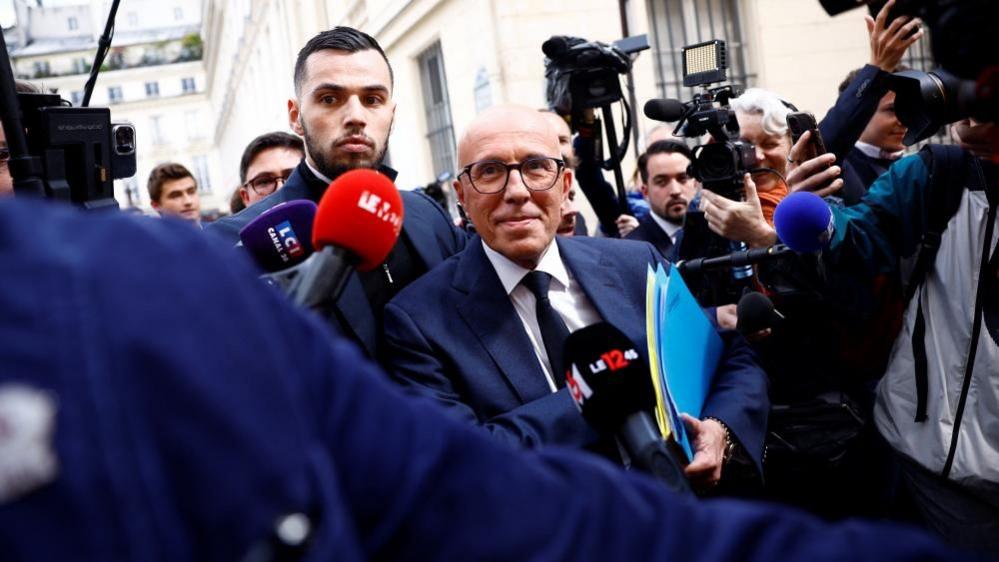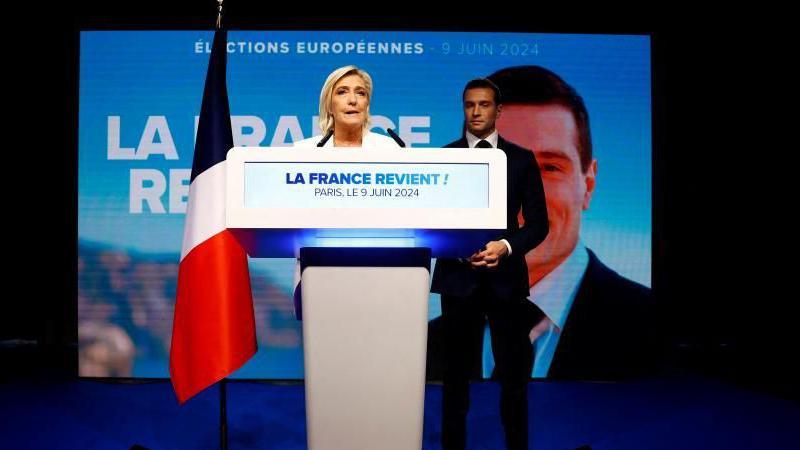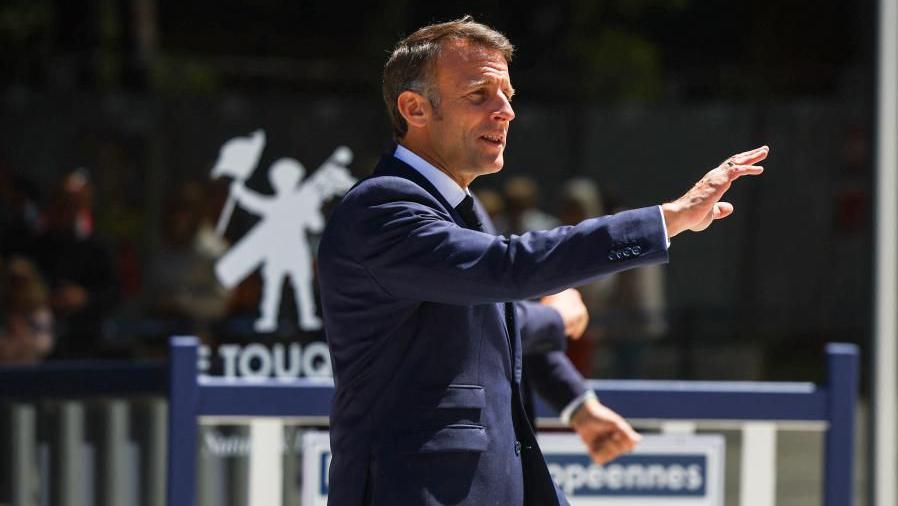French right uproar over call for far-right alliance

- Published
The leader of France's right-wing Republicans party, Eric Ciotti, has sparked an outcry after he backed an alliance with the far-right National Rally in snap elections announced by President Emmanuel Macron.
The anti-immigration party of Marine Le Pen and Jordan Bardella scored a dramatic victory in European elections on Sunday, prompting Mr Macron to dissolve parliament and call a first round of elections in 19 days' time.
The decision has sent shockwaves through French politics, not least among the Republicans party, which won only 7.25% of the vote and has seen many of its voters move to National Rally (RN).
For Republicans leader Eric Ciotti the solution was clear: "We need to have an alliance while remaining ourselves... an alliance with the National Rally and its candidates."
The snap election has prompted parties on both left and right to consider forming alliances to stand a greater chance of winning more seats. Left-wing parties have already agreed to abandon their differences to form a "popular front".
But never before has the traditional right in French politics made any sort of political accord with the far right and Mr Ciotti's remarks set a party that was already struggling to find a voice "on the verge of implosion", as Le Monde put it.
Mr Ciotti, who is on the right wing of his party, revealed he had already spoken to Marine Le Pen and Jordan Bardella. Ms Le Pen immediately praised his "courageous choice and sense of responsibility" and looked forward to an end to "40 years of a pseudo-cordon sanitaire" disappearing.
But his suggestion was immediately greeted with a chorus of derision. Outside party headquarters in Paris, supporters spoke of an act of treachery for a party whose origins lie with the first president of France's current Fifth Republic, Charles de Gaulle.
A clearly furious Republicans vice-president Florence Portelli said the party would fire Mr Ciotti for suggesting an accord with the far right. "I think there's a chance he can be made to leave, if he doesn't go by himself, and I have no doubt it'll happen," she told France Info TV.

Marine Le Pen and Jordan Bardella say they are ready to exercise power
Senate Republicans leader Bruno Retailleau accused him of disloyalty: "The Republicans will never form an alliance with the RN, we have deep ideological differences and we have to maintain our independence and integrity."
Many of Mr Ciotti's critics said he was driven by local politics in his home city of Nice. One MP, Vincent Descœur, said he was resigning in protest and another, Jean-Yves Bony, said he would too if Mr Ciotti didn't step down in 48 hours.
François-Xavier Bellamy, who led the Republicans in the European elections, said working with RN would merely be doing Mr Macron's work for him.
President Macron has explained his bombshell decision to call elections, saying he could not carry on after the European elections as if nothing had happened and did not want to come across as powerless.

He ruled out resigning as president "whatever the result" of the elections, which take place over two rounds on 30 June and 7 July, less than three weeks before the Paris Olympics.
"It's not the RN who write the constitution, or the spirit of it," he told Le Figaro.
National Rally won 31.4% of the vote on Sunday, more than double the 14.6% of Mr Macron's Renew alliance, while a resurgent centre left, led by Raphaël Glucksmann, reached 13.8%.
Another far-right party, Reconquest, took 5% of the vote, and there had been talk of the two parties forming an alliance for the next election.
But Marion Maréchal of Reconquest, who is Marine Le Pen's niece, said RN had decided against an alliance because they wanted nothing to do with her party's leader Eric Zemmour.
Macron snap election leaves rivals stunned after EU vote
- Published10 June 2024
Europe's night of election drama capped by Macron bombshell
- Published10 June 2024
Macron takes huge risk with surprise election
- Published9 June 2024
At the last parliamentary election, France's notoriously divided left-wing parties formed a group called Nupes, bringing together the Socialists, far-left France Unbowed (LF), Communists and Greens.
Despite Nupes imploding amid even wider divisions over issues such as the war in Gaza, the left parties have agreed to form a pact to fight the new elections.
Although Mr Macron won a second term two years ago, his party failed to secure a majority in parliament, making it a struggle to pass legislation.
He has often had to rely on support from the Republicans to do so, so his decision to call elections is a big risk, especially when he is facing defeat.
The first opinion poll taken since Sunday's elections suggests National Rally would win 34% of the vote, ahead of 19% for Mr Macron's party.
But until now the two rounds of a parliamentary election have been tricky for National Rally as they have often struggled to win more than 50% of second-round run-off votes because their opponents tend to coalesce against the far right.
It is so far unclear whether their dramatic success on Sunday may have changed that.